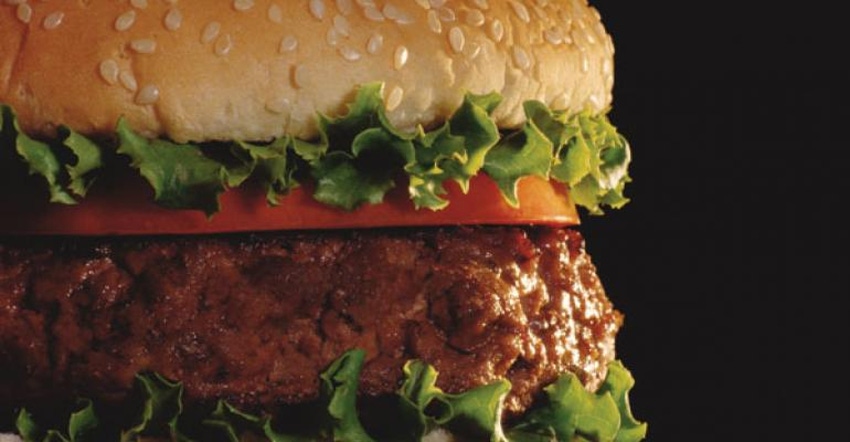War on burgers continues with false environmental impact claims
One restaurant encourages consumers to reduce their beef consumption 95% to save the planet. Here’s how the industry should respond.
June 28, 2018

Is beef a “climate villain?”
That’s what Kaj Török, chief reputation officer and chief sustainability officer at Sweden-based restaurant chain Max Burgers, is telling consumers after the business unveiled a new “climate-positive” menu featuring vegan and lacto-ovo vegetarian burgers and announced its goal that by 2022, every second meal served will be made without beef.
In an article featured online at trustinfood.com, Török explains that Americans can help prevent catastrophic sea-level rise, devastating droughts and other predicted consequences of climate change simply by reducing their annual consumption of beef by 95%. (That would mean per-person consumption of beef would drop to 2.8 lbs. annually, compared to the current 55.7 lbs.)
“If the world is going to be sustainable, we will eat much less meat and meat with a much lower climate impact,” said Török, in a recent interview. He further explained that Max Burgers is doing so well because of younger consumers who are seeking food that is perceived as healthier, better for the environment and kinder to livestock.
READ: There’s livestock emissions then there’s hot air
And just like today’s mainstream media reports, the perception that beef is bad for the planet, abusive to animals and an unhealthy food for regular consumption is, without question, “fake news.”
However, like Mark Twain once famously said, “A lie can travel halfway around the world while the truth is putting on its shoes.”
Unfortunately for beef, these falsehoods have traveled extensively around the world. Does the thoroughly debunked United Nation’s report “Livestock’s Long Shadow” ring a bell? Scarily enough, this misinformation is not only widely accepted but it is being used to develop policy and police what people eat, how land is managed and what types of food we should produce to feed a growing planet.
READ: Livestock’s shrinking U.S. shadow
What’s worse, if we were to eliminate or greatly reduce cattle grazing and strip these grasslands to grow legumes and broccoli, I fear the rates of chronic related diseases that could be avoided by eating a protein-rich diet would escalate even faster than they already have.
So what’s the best way to address the fake news about beef and its climate impact? It starts with finding credible, accurate information on the topic and spreading it like wildfire. I’ve rounded up several good reads that address this topic, including:
“Sustainable beef? U.S. has most environmentally friendly livestock industry in the world” by Wes Ishmael for BEEF
U.S. livestock production has the smallest carbon footprint per unit of production in the world.
“Time for a 180 on cows and climate” by Joann S. Grohman for The Weston A. Price Foundation
Grohman writes, “It is clear that far from being a destructive force, cows are the key to rebuilding air quality and soil fertility. Cows provide for us by completing the cycle of life on our own farms or on the rangelands of the world, turning sunshine into food of the highest quality and taking the excess carbon out of the air and putting it back into the soil where it is needed.”
“Impacts of soil carbon sequestration on life cycle greenhouse gas emissions in Midwestern USDA beef finishing systems” featured on ScienceDirect
The study concludes that feedlot produces lower emissions than adaptive multi-paddock grazing and that Soil C sequestrations from well-managed grazing may help to mitigate climate change.
Nicolette Hahn Niman, an environmental lawyer and vegetarian turned cattle rancher provides a well-researched case for sustainable meat.
Yes, it’s difficult to turn around public perceptions, but knowing that some companies have a goal of reducing beef consumption by 95% should be enough to alarm every producer in this industry. We’ve got our work cut out for us, but thankfully, the truth and science is on our side. Start by sharing this blog post on social media to help spread the good news — beef is good for us and good for the planet, too.
The opinions of Amanda Radke are not necessarily those of beefmagazine.com or Farm Progress.
About the Author(s)
You May Also Like




.png?width=300&auto=webp&quality=80&disable=upscale)
